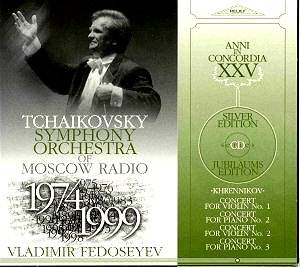What a line-up; Repin, Kissin, Vengerov! Khrennikov
certainly commanded celebrity status and was able to call on these
stars at the very start of their careers. No doubt Khrennikov's
cultural supremo status helped. He was appointed by Stalin as
permanent director of the Composers' Union of the USSR - a position
he held for 43 years. That very status and his role in connection
with the denunciation of Prokofiev, Shostakovich and others has
played its part in the neglect of his music. As if politics, even
of the most extreme persuasion, had anything to do with musical
merit.
In this disc of four Khrennikov concertos we
are granted the privilege of making up our own minds. Each is
in three movements. Each is compact - no more than twenty minutes
long and as short as just over fifteen minutes. Each is in C major.
The First Violin Concerto is flashy and
brash in the outer movements rather like the Kabalevsky Violin
Concerto. Sparks fly and lightning flashes at breakneck speed
with memories of the Khachaturyan's concerto slipping in. The
andante espressivo picks up on the oriental enchantment
that distinguishes so much Russian music stretching from the late
19th century onwards.
The Second Piano Concerto starts audaciously
with a long introduction for the piano unaccompanied - the orchestra,
silent until about 2.56 when the strings enter - sounding rather
tortured it has to be said. The second movement sonata is
a thunderous neo-Lisztian cauldron with Soviet style motor rhythms
criss-crossing the landscape. Kissin relishes all of this as much
as the glittering light-hearted rondo giocoso which is
transformed into a far from bombastic thoughtful andantino
which ends the concerto quietly.
The Second Violin Concerto begins in the
usual access of virtuosic activity this time recalling Rawsthorne
in the triumphal outer movements. The big Moderato second
movement emerges after the allegro con fuoco ends self-effacingly.
It has the feeling of an extended love song (tr.8 2.12) with the
violin as the suitor. The theme is taken over by the orchestra
and rises to a bombastic blare but even as this falls away the
romantic theme returns in self possessed splendour. Vengerov is
on fine form and even draws a bravo from the otherwise reticent
Moscow audience.
The composer himself is soloist in the Third
Piano Concerto. It carries the latest opus number in this
selection. Like the Second Concerto it starts with the piano unaccompanied
establishing itself as the Alpha male before the orchestra puts
in an appearance. The orchestra enter with a pompous march theme
with the soloist acting as raucous hortator rather than combatant.
The music rises to a Technicolor climax with the unblushing use
of crashing cymbals (tr.10 6.10). It ends in a sort of eerie postlude
with the wraithlike violins 'rattling their chains' as the piano
says a long farewell. Rather good. Another Moderato follows,
in which the piano deliberately picks out a highly romantic theme
with a musing Rachmaninovian character but edgily stony. As in
the first movement so here; the music rises this time to a bruising
brass orated climax (3.02) then falls away into silence ushered
by the piano seemingly exhausted by the brazen climax. The finale's
modest dissonance does little to dilute the effect of some excitably
assertive music.
There is applause at the end of each of these
concert performances. Judging by the photograph of all the soloists
grouped around the composer they were given at a single celebratory
concert.
Sadly the booklet tells us hardly anything about
each Concerto.
This disc will appeal to a double audience. Collectors
of Kissin, Vengerov and Repin recordings will have to have this;
an invaluable souvenir of artistry in their early or late teens.
The second and no doubt smaller audience will be those who are
curious to hear the music of a leading establishment figure in
Soviet music-making.
There are or have been a few other Khrennikov discs. Mobile Fidelity
had the Second Symphony (MFCD 907). Vox Allegro
had the same symphony and one of the violin concertos on a bargain
price disc. Before that there had been a sparse scattering of
LPs including several EMI-Melodiyas during the 1970s.
How best to sum his music up? It is showy but
not without tenderness. Khrennikov can be compared with Kabalevsky
but lacks that composer's ready gifts. His music tends to be more
vinegary than Kabalevsky's and his themes do not have instantly
captivating immediacy. There is dissonance in his music to a noticeably
greater degree than Kabalevsky. This is not as extreme as say
1970s vintage Pärt (whom he no doubt villified) being closer
to Rawsthorne.
Rob Barnett
